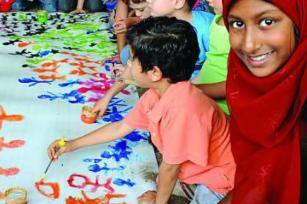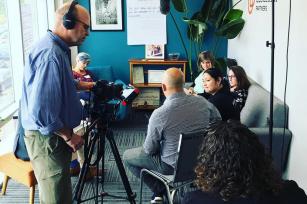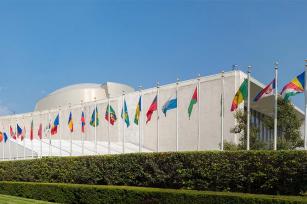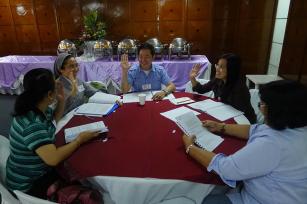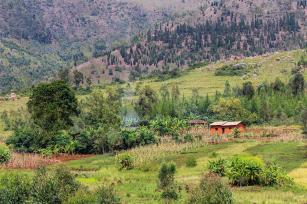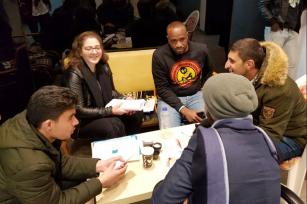
Breadcrumb
- Essential Partners
- Our Impact
- Impact Stories
- Helping Rebuild Post–Civil War Liberia
Helping Rebuild Post–Civil War Liberia
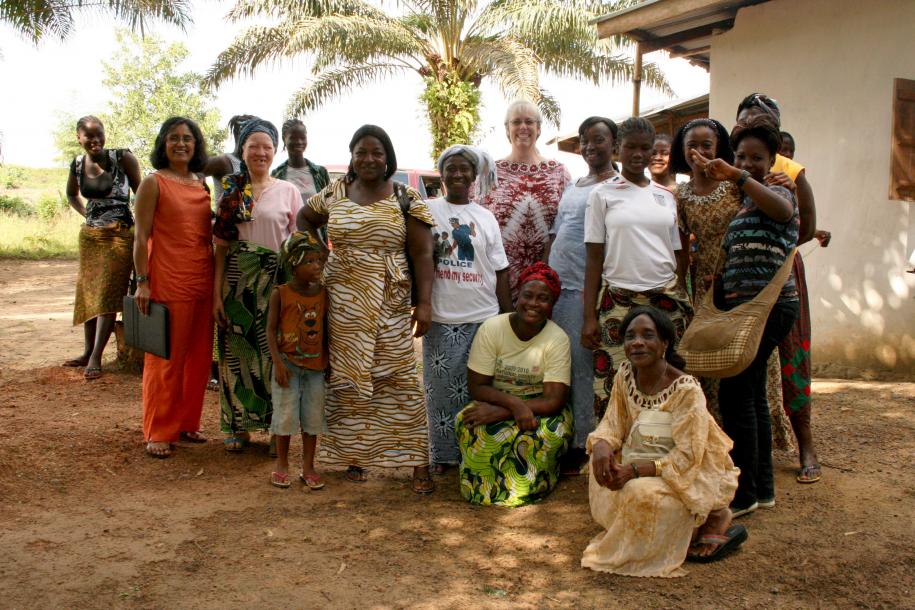
“Since the war, people have had to rebuild their entire society, and part of that is learning how to live alongside people with very different views.”
Ginny Morrison, Liberian Initiative Co-Director
Essential Partners
In the aftermath of two violent civil wars, which together lasted more than 14 years (from 1989-2003) and took hundreds of thousands of lives, Liberia was faced with social, political, and economic devastation as it endeavored to mend internal fractures and heal from the trauma of violence.
Rebuilding a sense of community and country was a universal struggle, but reintegration was particularly difficult for those who fought during the war. Among the most vulnerable: female ex-combatants, who were stigmatized for their involvement in the war, and also shamed for the sexual violence that most of them experienced.
“If the community shuns them, they have no practical way of meeting needs for food and shelter,” explained Ginny Morrison, Liberian Initiative Co-Director. “Since the war, people have had to rebuild their entire society, and part of that is learning how to live alongside people with very different views.”
Women Hold Up Half the Sky
Essential Partenrs collaborated with four Liberian organizations as well as the international peace-building nonprofit Mediators Beyond Borders (MBB) to explore how the healing of women could restore community and promote other types of recovery.
The pilot project, “Women Hold Up Half the Sky,” tapped into women’s ability to make change at the community level.
Local partners worked to create conditions in which women ex-combatants could build relationships in their communities while learning permacululture, which would provide them with a consistent livelihood. Meanwhile, the capacity of Liberian peace-building organizations was bolstered by training them in dialogue facilitation and building resilience after trauma.
In helping these women become self-sustaining and reintegrate into society, EP hopes that they will be able to contribute to the rebuilding of their communities.
“There is incredible potential for these women, some of whom have played leadership roles,” remarked project co-director Prabha Sankaranarayan. “Think of what is possible if these women are re-empowered but in a way that makes them a part of their communities. That’s the potential I see.”
The Groundwork to Resolve Conflicts
Following training in dialogue facilitation and leadership, recent trainees immediately put their skills to use in a situation where communication had broken down. They worked together to plan and facilitating two simultaneous dialogues.
Local partners incorporated their new knowledge into the mentoring of community members, who modeled new skills among their towns and villages. By increasing the community’s capacity to support residents, the dialogue training laid the groundwork to resolve conflicts, implement development projects, and reweave the community fabric.
Bill Saa, project coordinator, noted the value of rebuilding relationships in the wake of the civil war: “[The women will] be able to discuss their issues—the issues they face in the community, in their families—and will be able to support each other in finding ways to move through those issues.”
Related Impact Stories
Testimonials

Etionette Nshirmirimana, Burundian Master TrainerI realized that by using the “dialogue” approach, people could talk of what is deep in their heart, especially things that have harmed them.
Burundi

Romeo McCauley, Project PartnerI learned that I can build relationships, that I can be connected to anybody who I want to be connected to, no matter how difficult it is
Liberia

Windor DorkoAs a former rebel, I really believe that if we had known about dialogue, perhaps we would not have had a civil war.
Liberia

Undergraduate StudentI notice that my classmates take much more care when speaking about people who practice other religions. They make fewer assumptions, and they’re more careful with their words to make sure to avoid unintentional connotations.
Bridgewater College, Virginia

Belle AbayaWhat is special about Essential Partners' approach is that it promotes authenticity, reduces defensiveness, increases curiosity, and boosts connectedness.
The Conflict Resolution Group Foundation, Philippines

Program ParticipantThis is the best adult learning experience I have had in the past five years. I wanted to learn new skills—I did!

Matthew Sandikie, Project PartnerThis has been quite different from other discussions in Liberia about peace. While many processes have been about how to reform ex-combatants, this was about how we may hold our own views but live together peacefully.
Liberia

Dr. Shi-Jiuan WuEssential Partners is a world treasure, especially for having conversations on oppositional topics, which is very challenging.
Taiwan

Bob Bordone, Expert and AuthorEssential Partners does the best work in the field of dialogue and communication.
Harvard Negotiation & Mediation Clinical Program, Co-Founder

Program ParticipantI felt an amazing sense of accomplishment when the Essential Partners training ended; that I'd done something important for my community and something important for me.
Massachusetts

Nicki Glasser, Policy CoordinatorWhat surprised me was how much you could transform a relationship during a three-hour conversation.
Transformation Center, Massachusetts

Belle AbayaTogether, we married our ideas to create a dialogue model that took into consideration our young people’s particular needs, and our culture.
The Conflict Resolution Group Foundation, Philippines

Program ParticipantI did not anticipate having as many concrete takeaways as I do. I feel there is an immense practical application.
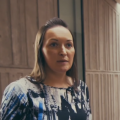
Louise O’Kane, Community Places[Essential Partners’] technique is used to explore contentious or divisive issues. So looking at renewable energy we thought this was an ideal opportunity to explore all the complexities of that issue. I found it a really useful method, and although this is the first time we’ve used it I am sure we’ll be using it again.
Northern Ireland, UK

Kate CellThe thing that always feels like magic to me—and I’ve used it in several meetings that I’ve had since—is how the practitioners start by setting out pacts or agreements.
Union of Concerned Scientists, Massachusetts

Imam Sani IsahThrough this training, we will have more people in the stream of work that we do and become better equipped with the know-how, skills and techniques. But most important, together we will sow a seed that will germinate and become a source of the antidote to terrorism, fanaticism, bigotry and extremism.
Nigeria

Belle AbayaAuthentic conversations will lead people to reflect on their own thinking and transform their perspectives to include that of others.
The Conflict Resolution Group Foundation, Philippines

Program ParticipantThis is a new idea, so many people speaking from their hearts. People can come together...if people can understand, they can change their hearts; then this can bring about more change.
Interfaith Mediation Centre, Nigeria

Program ParticipantThis is a different tool for engagement. It’s not about you, it’s about others. It involves the art of listening and sincerely talking from the heart
Interfaith Mediation Centre, Nigeria

Seth Karamage, MediatorI am amazed at what came out—the way people shared their stories. This is not like a role-play; it really touched me.
Interfaith Mediation Centre, Nigeria

Kim Davidson, OmbudsI’ve gained not only confidence but tools. The Essential Partners training was worth every penny.
Oberlin College, Ohio

Douglas Stone, Sheila Heen, and Bruce PattonWe owe a debt of gratitude to Laura Chasin and her collaborators at Essential Partners… From them, we have learned about the transformative power of telling one’s story and speaking to the heart of the matter.
Difficult Conversations

Program ParticipantBefore, I thought all dialogue that does not culminate in solution was considered equivalent to failure. Now I see that dialogue is a stage complete in itself.
Burundi
